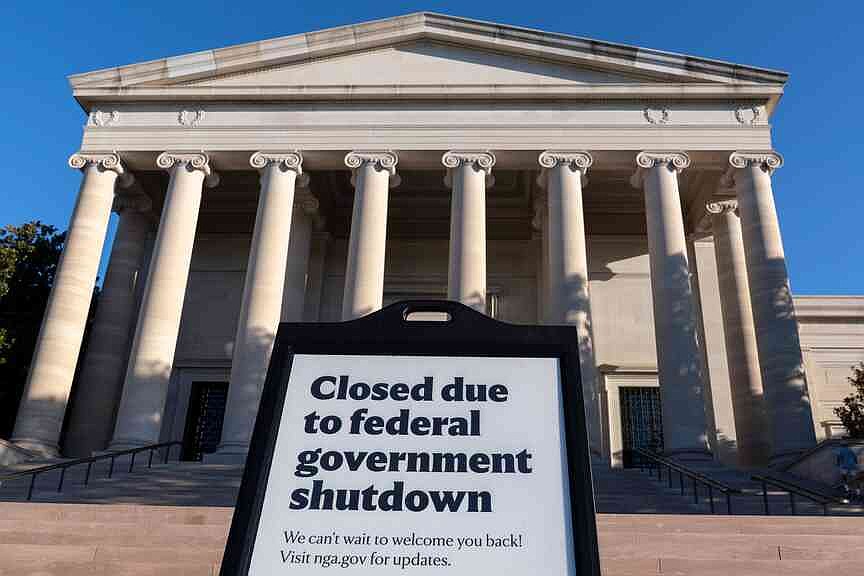
WASHINGTON — President Donald Trump’s administration warned Tuesday of no guaranteed back pay for federal workers during a government shutdown, reversing what has been longstanding policy for some 750,000 furloughed employees, according to a memo being circulated by the White House.
Trump signed into law, after the longest government shutdown in 2019, legislation to ensure federal workers receive back pay during any federal funding lapse. But in the new memo, his Office of Management and Budget says back pay must be provided by Congress, if it chooses to do so, as part of any bill to fund the government.
“There are some people that don’t deserve to be taken care of, and we’ll take care of them in a different way,” Trump said during an event at the White House.
He said back pay “depends on who we’re talking about.” Asked a second time about back pay for furloughed federal workers given that the requirement is spelled out in law, Trump said: “I follow the law, and what the law says is correct.”
While federal workers — as well as service members of the military — have often missed paychecks during past shutdowns, they are almost always reimbursed once the government reopens.
“That should turn up the urgency and the necessity of the Democrats doing the right thing here,” House Speaker Mike Johnson said at a news conference at the Capitol.
Johnson, a lawyer, said he hadn’t fully read the memo but “there are some legal analysts who are saying” that it may not be necessary or appropriate to repay the federal workers.
But Democratic Sen. Patty Murray of Washington blasted the Trump administration as defying the law.
“Another baseless attempt to try and scare & intimidate workers by an administration run by crooks and cowards,” said Murray, who is the ranking lawmaker on the Senate Appropriations Committee. “The letter of the law is as plain as can be — federal workers, including furloughed workers, are entitled to their backpay following a shutdown.”
The move by the Republican administration was widely seen as a strongarm tactic — a way to pressure lawmakers to reopen the government, now in the seventh day of a shutdown. Another congressional Democrat, however, said he expected the back pay move to have the opposite effect.
“Honestly, the impact it seems to have had on Democrats here is people kind of digging in their heels harder and not wanting to give an inch to those kind of hollow threats,” Rep. James Walkinshaw, D-Va., told The Washington Post on Tuesday. “And the latest threat to not pay furloughed federal workers at the end of the shutdown I think is in precisely the same category. The law is just very clear.”
Senate Majority Leader John Thune, a Republican, said, “My assumption is that the furloughed workers will get paid. I’ll find out. I haven’t heard this up until now.”
In the memo draft prepared for Trump’s Office of Management and Budget Director Russell Vought, first reported by Axios, the office’s general counsel Mark R. Paoletta lays out a legal rationale for no back pay for federal workers.
“(The Government Employee Fair Treatment Act) directive to pay contingent on the enactment of some future legislation is simply not the type of unconditional obligation that would guarantee, without further action by Congress, that furloughed employees would receive back pay,” the memo states.
The memo explains that while the Government Employee Fair Treatment Act of 2019 says workers shall be paid after federal funding is restored, it argues the action is not self-executing. Instead, the memo says, repaying the federal workers would have to be part of subsequent legislation, presumably in the bill to reopen the government.
“The legislation that ends the current lapse in appropriations must include express language appropriating funds for back pay for furloughed employees, or such payments cannot be made,” Paoletta wrote to Vought.
The Office of Management and Budget analysis draws on language familiar to budget experts by suggesting that the 2019 bill created an authorization to pay the federal workers but not the actual appropriation.
Congress, it says, is able to decide whether it wants to pay the workers or not.
Policymakers, including leading appropriators in Congress and Johnson, the House speaker, had generally interpreted the law in a more straightforward fashion: that new legislation to fund agencies would also automatically pay the government’s employees, whether furloughed or working without pay.
“It is a lucid reinterpretation of the law, but clearly against its intent,” said Robert Shea, a budget expert and former Republican Office of Management and Budget official.
Guidance last month from the Office of Personnel Management, which acts as the federal government’s human resources department, to workers and agencies said the 2019 law required the government “to provide retroactive pay for Federal employees affected by a lapse in appropriations as soon as possible after the lapse in appropriations ends, regardless of scheduled pay dates, and subject to the enactment of appropriations Acts ending the lapse.”
Also, multiple agencies have told their workers they would receive pay once the shutdown ended.
A frequently-asked-questions document on the White House’s website had said as of Sept. 30 that “both furloughed and excepted employees will be paid retroactively.” However, the document was quietly amended Friday to take out the reference to the 2019 law. The trade publication Government Executive first reported the change Tuesday.
For now, Congress remains at a standstill, with neither side — nor the White House — appearing willing to budge. Democrats are fighting for health care funds to prevent a lapse in federal subsidies that threaten to send insurance rates skyrocketing. Republicans say the issue can be dealt with later.
Information for this article was contributed by Lisa Mascaro, Will Weissert, Kevin Freking, Joey Cappelletti and Mary Clare Jalonick of The Associated Press; and by Jacob Bogage, Hannah Natanson, Meryl Kornfield and Theodoric Meyer of The Washington Post.